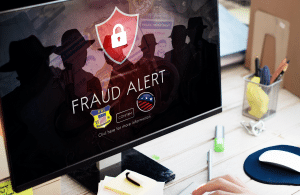
“The nine most terrifying words in the English language are: I’m from the government and I’m here to help.” said the 40th President of the United States, Ronald Reagan.
However, these scammers are not from the government, and they are not here to help. They are here to rip you off.
In the US government, there are hundreds of business regulations; and you can’t know them all-no one expects you to know all the details. This is what these government pretenders depend on to gain access to your business.
In Person: An impostor shows up at your business with fake credentials. They claim to be from one of the hundreds of Local, State, or Federal government agencies and the credentials look very credible. Their favorite line is: “we are here to help.”
Once inside the premises, the scammer will point out all your “violations”-from hallway measurements to ceiling heights, from number of bathrooms in the building to outside parking spaces. Once they have established “credibility” with you, the next step is they offer to help you clear these violations. Usually they move into an “I understand mode” to gain your trust and for you to agree to let them clear these “violations” on your behalf. Quickly, they emphasize that these violations can abruptly shut you down if not cleared promptly.
Small businesses have been scared into buying workplace compliance posters and conveniently these posters are available in the back of the car the scammer is driving. By the way, workplace compliance posters are available free from the U.S. Department of Labor.
By Letter: Businesses have received letters claiming to be from the U.S. Patent and Trademark Office, warning that they’ll lose the trademark(s) if they don’t pay a fee immediately. Of course, the agency will be happy to accept immediate payment to retain your trademark. Some small businesses have been tricked into buying licensing fees, paying for fake business permits, or registration fees to receive nonexistent business grants.
By Phone: You receive a call or email from scammers pretending to be from the FBI, the CIA or a local law enforcement agency stating that there is a warrant for your arrest. They will be happy to help you avoid imminent arrest by collecting the fine over the phone, often in the form of gift cards. Americans were scammed into buying $148 million in gift cards in 2021 alone.
Another effective scam is to read over the phone a long litany of charges being considered against you; just then the scammer will offer to clear up the “mistake” if you just agree to give them your Social Security Number and Date of Birth.
There are so many scams that the FBI issued a Public Service Announcement in March of 2022 in an attempt to warn Americans about government imposters.
Most government offices, like the IRS, will contact you primarily through the US Postal Service. If you are contacted by email or phone by someone pretending to be a government official, it’s probably a scam.
Second, if they call, don’t trust Caller ID. Scammers can use Caller ID Spoofing to fake their ID. Go on-line and verify that the agency that you are talking to is real. There is no Department of Koi Pond Monitoring and investigating the name of the “agency” through Googling, it will take less than a minute.
Finally, if they claim to be from a real government agency, no matter how you are contacted, go online, look up the phone number of the agency and call. You can also call 844-USA-GOV1 to talk to a live person who will guide you to the correct agency. Every government agency still has someone answering the phone. If you really have a problem with a government agency, the person answering the phone will be able to look up your case and transfer you to someone who can help you.
Learn the signs of SCAMS by GOVERNMENT AGENCY IMPOSTERS. You can educate yourself on the wide range of fraud tricks by going to the FBI’s Scams and Safety page. If you spot a government impersonation scam, report it to the FTC at ReportFraud.ftc.gov or your state’s attorney general.